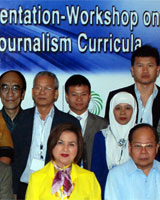Journalism teachers from Southeast Asia review UNESCO Model Curricula for Journalism Education
06-07-2009 (Manila)

Participants of the workshop.
© Philippines National Commission
for UNESCO
Journalism educators from Southeast Asia welcomed the UNESCO Model Curricula for Journalism Education as a benchmark in preparing or revising journalism programmes in the region. This was one of the agreements arrived at by some 30 journalism teachers from the region who attended the two-day ASEAN Orientation Workshop on the UNESCO Model Curricula for Journalism Education, held on 25 and 26 June 2009 in Pasig City, Philippines.
The workshop was convened by the National Commission of the Philippines for UNESCO, in cooperation with the Manila-based Asian Institute of Journalism and Communication (AIJC), Philippine Association of Communication Educators (PACE) and Philippines Communication Society.
Journalism education faces serious challenges in the region where press freedom is rated by the Freedom House in 2008 as either partly free or totally not free. Meanwhile, the World Audit on Press Freedom 2008 cited the Philippine media with the highest ranking at 62 among ASEAN countries, while Laos’ media was tagged the least free with 136 ranking.
During the UNESCO workshop participants reported that the lack of democratic space does not discourage journalism educators from teaching the basic tenets of journalism - truth, justice and freedom. The teachers expressed optimism that a broader public sphere will eventually prevail and that the press, and journalism education in particular, will play a significant role in attaining this vision.
Many of the journalism educators from the ASEAN countries said they were not aware of UNESCO’s Model Curricula. The workshop provided an opportunity to learn about this publication and to plan its use as bases for reviewing existing curricula. In countries where there are no existing journalism schools, such as Myanmar and Timor Leste, the Model Curricula can serve as inputs in planning formal journalism programmes.
According to Prof. Michael Cobden, a resource person during the workshop, the Curricula developed under the auspices of UNESCO were for undergraduate, graduate (master’s) and diploma programmes. The two-year diploma may be taken as a basic preparation for journalism or as a bridge from secondary school to a university programme, while a one-year diploma programme is geared to upgrade the needs of practicing journalists. Prof. Cobden was the team leader of the UNESCO Experts Team that prepared the Model Curricula.
Participants identified issues and concerns that may affect the adoption of the Model Curricula. Lack of qualified teachers who can handle courses listed in the Curricula was a common concern. Many journalism schools in the region also lack equipment and facilities. Books and other references are mostly western. Curriculum planning involves tedious bureaucratic and academic processes.
The journalism teachers agreed to organize a regional network that would facilitate faculty exchange and the sharing of curricula and teaching-learning resources, including books and other references, among journalism schools and teachers. A portal will be developed soon wherein journalism schools and training institutes in the region will be invited to participate.
Countries represented at the workshop included Cambodia, Indonesia, Malaysia, Myanmar, Philippines, Thailand and Vietnam. Papers from Singapore and Timor Leste were also presented.
Journalism education faces serious challenges in the region where press freedom is rated by the Freedom House in 2008 as either partly free or totally not free. Meanwhile, the World Audit on Press Freedom 2008 cited the Philippine media with the highest ranking at 62 among ASEAN countries, while Laos’ media was tagged the least free with 136 ranking.
During the UNESCO workshop participants reported that the lack of democratic space does not discourage journalism educators from teaching the basic tenets of journalism - truth, justice and freedom. The teachers expressed optimism that a broader public sphere will eventually prevail and that the press, and journalism education in particular, will play a significant role in attaining this vision.
Many of the journalism educators from the ASEAN countries said they were not aware of UNESCO’s Model Curricula. The workshop provided an opportunity to learn about this publication and to plan its use as bases for reviewing existing curricula. In countries where there are no existing journalism schools, such as Myanmar and Timor Leste, the Model Curricula can serve as inputs in planning formal journalism programmes.
According to Prof. Michael Cobden, a resource person during the workshop, the Curricula developed under the auspices of UNESCO were for undergraduate, graduate (master’s) and diploma programmes. The two-year diploma may be taken as a basic preparation for journalism or as a bridge from secondary school to a university programme, while a one-year diploma programme is geared to upgrade the needs of practicing journalists. Prof. Cobden was the team leader of the UNESCO Experts Team that prepared the Model Curricula.
Participants identified issues and concerns that may affect the adoption of the Model Curricula. Lack of qualified teachers who can handle courses listed in the Curricula was a common concern. Many journalism schools in the region also lack equipment and facilities. Books and other references are mostly western. Curriculum planning involves tedious bureaucratic and academic processes.
The journalism teachers agreed to organize a regional network that would facilitate faculty exchange and the sharing of curricula and teaching-learning resources, including books and other references, among journalism schools and teachers. A portal will be developed soon wherein journalism schools and training institutes in the region will be invited to participate.
Countries represented at the workshop included Cambodia, Indonesia, Malaysia, Myanmar, Philippines, Thailand and Vietnam. Papers from Singapore and Timor Leste were also presented.
 Participants of the workshop.
Participants of the workshop.© Philippines National Commission for UNESCO
Related themes/countries
· Cambodia
· Indonesia
· Malaysia
· Myanmar
· Philippines
· Thailand
· Viet Nam
· Training of Media Professionals
· Timor-Leste
· Singapore
· Press Freedom: News Archives 2009
· Asia and the Pacific: News Archive 2009
Share this story:
Contact information
- AIJC
Source














